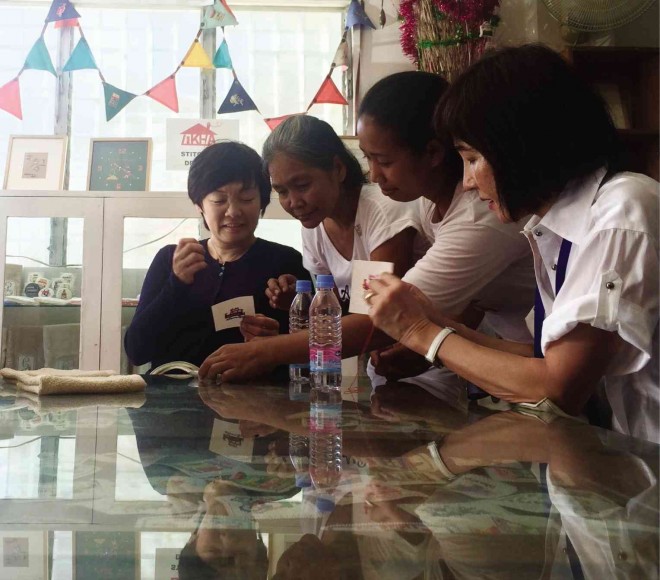
JAPAN’S first lady, Akie Abe (left), meets the beneficiaries of a Japanese-backed foundation in Payatas, Quezon City. Erika Sauler
The first lady of Japan on Wednesday visited the Quezon City community that has formed around the Payatas dump, offering flowers in memory of the 2000 “trash avalanche” victims and hearing the life stories of scavengers, one of whom moved her to tears.
Akie Abe, who arrived in Manila with Japan Prime Minister Shinzo Abe for the Asia-Pacific Economic Cooperation meetings, came mainly to see the work of Salt Payatas Foundation Philippines Inc., a Japanese nongovernment organization (NGO) that has been helping residents through scholarships and livelihood programs since 1995.
“She wants to see the situation of children working as scavengers. She’s interested in children and wants to observe the project of the NGO,” said Jun Komase, media coordinator from the Japanese Embassy. Akie Abe was also accompanied by Yoko Ishikawa, wife of Japanese Ambassador Kazuhide Ishikawa.
Abe viewed the dump from an elevated deck and later spoke with Trinidad Flores, 58, one of the beneficiaries of Salt’s Likha Pangkabuhayan, at the latter’s shanty.
“I couldn’t help it. I cried while telling her how Likha has changed my life—and how happy I was to meet her,” Flores said in an interview later. “She also cried.”
A native of Leyte province, Flores moved to the capital in 1987 and lived in the slums of South Triangle, Quezon City, until her house was demolished. Moving to Payatas, she, her husband, and their three children have since been eking out a living picking through trash for recyclables.
After the trash slide that killed more than 200 people in July 2000, Salt Foundation set up Likha to help scavengers find alternative trades. Mothers like Flores, who were taught embroidery, now earn from the sale of Likha products like towels, card cases, book covers, etc.
“Kawaii (cute)!” Abe said when presented a cross-stitch work featuring her name and the image of a jeepney. Before leaving, she bought six towels from the Likha shop.
According to Likha program manager Oraida Punay, many Japanese celebrities and writers have made low-key visits to Payatas to personally see the NGO’s work. With Krizia Jamille Yap and Ria Consuelo Mendoza